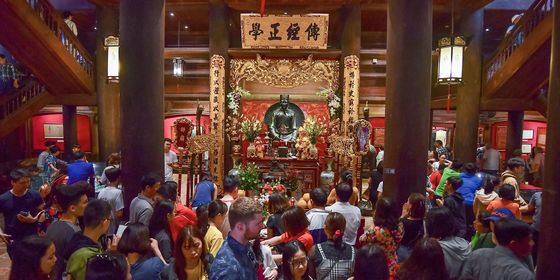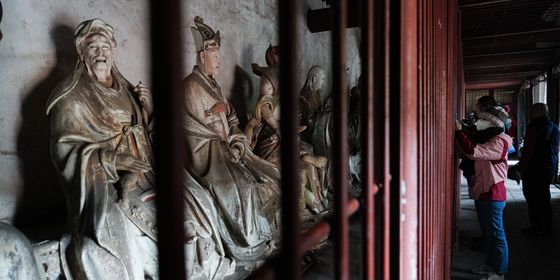Learn these essential Chinese “chengyu” to describe your unique vacation travel styles
With the arrival of the seven-day National Day break in China, travel is spiking once again across the country. During the extended holiday, one of the longest of the year (made possible thanks to loathed weekend make-up work days), travelers embrace distinctive styles—from packed itineraries, serene retreats, to in-depth culture-focused adventures—to make the most of their precious time off.
These habits have spawned a host of travel-related slang, such as “special forces-style travel (特种兵式旅游 tèzhǒngbīngshì lǚyóu),” describing budget-conscious and rapid sightseeing tours, and “check-in (打卡 dǎkǎ)” tourism, referring to visiting tourist hotspots mostly for social media bragging rights. But besides these viral online phrases, there are some long-existing chengyu that also come in handy when talking about travel.
Trekking over mountains and crossing rivers 跋山涉水
Lovers of the outdoors, hiking, and camping will usually escape the bustle of urban areas, putting as much distance between themselves and the daily grind. Their trips can be characterized by 跋山涉水 (báshān shèshuǐ) or adventurous outdoor expeditions involving “scaling mountains and fording streams.” Campers, meanwhile, can be described as preferring to 风餐露宿 (fēngcān lùsù), “eating in the wind and sleeping in the dew.” For these travelers, the challenges posed by adventures far from civilization add a unique flavor to their experiences, but others who don’t understand might be left asking:
Isn’t it asking for hardship, braving mountains and rivers, and sleeping under the stars?
这跋山涉水,风餐露宿的,不是找罪受吗?
Learn more about Chinese idiom:
- Join the Wukong Hype in 4 Characters
- How to Complain About Your Boss in 4 Characters
- How to Flaunt Your Wealth in 4 Characters
Travel day and night 日夜兼程
For those into “special forces-style tourism”—usually cash-strapped college students—time is particularly of the essence. To visit as many places as possible, they often prepare a comprehensive itinerary ahead of time, requiring them to start their days early and end late. In some extreme cases, they may even travel through the night without sleeping. This style of tourism can be summarized by the idiom 日夜兼程 (rìyè jiānchéng), meaning to travel continuously, no matter the time of day. Although exhausting, seeing numerous sights in a short span can bring them immense satisfaction.
They traveled day and night, visiting 25 attractions in four cities within three days.
他们日夜兼程,三天去了四个城市,二十五个景点。
Leisurely exploring mountains and rivers 游山玩水
For others, however, the meaning of travel exists in relaxation. These people choose to slow down, enjoying their sightseeing as it comes. So, while their itinerary may also involve climbing mountains and descending rivers, it can be described as 游山玩水 (yóushān wánshuǐ), “touring mountains and playing in the water.” Accordingly, their state of being during such travels is 优哉游哉 (yōuzāi yóuzāi), or “leisurely and carefree.”
Compared to group tours, I prefer to go sightseeing at a leisurely pace by myself.
比起跟团,我还是更愿意一个人优哉游哉地游山玩水。
Flower viewing from horseback 走马观花
In recent years, “check-in tourism” has become increasingly popular, especially among young people. Armed with a list of trendy tourist spots, they visit each one by one to take photos and post them on social media. While this method may fulfill a desire to share and showcase their experiences, when viewed almost entirely through the screen of a phone, it’s debatable how much its adherents can truly appreciate a place’s charm or history. The idiom 走马观花 (zǒumǎ guānhuā), literally translating to “watching flowers on a running horse,” vividly describes such a condition, perfectly capturing the superficial nature of wanghong (网红) life.
Due to the tight schedule, he could only take a cursory tour of the museum.
由于时间紧迫,他只能走马观花地参观了博物馆。
Exploring tranquil scenery 寻幽探胜
In contrast, some prefer in-depth exploration, focusing instead on attempting to understand local cultures through experience. They might visit an ancient village in hopes of uncovering forgotten stories or spend an afternoon in a café simply enjoying the tranquility of its environment. This approach is encapsulated by the idiom 寻幽探胜 (xúnyōu tànshèng), meaning to seek out locations renowned for their peacefulness and beauty.
She enjoys photography and often explores secluded and beautiful places, capturing the beauty of nature through her lens.
她爱好摄影,经常寻幽探胜,用镜头捕捉大自然的美。
When in Rome 入乡随俗
Adherents of “when in Rome” travel go one step further, immersing themselves in a culture to live as the locals do. In Chinese, this can be expressed as 入乡随俗 (rùxiāng suísú), or enter the village and follow the customs. These travelers see abiding by local customs and experiencing different traditions as a way to show respect as well as an opportunity to gain new perspectives on life.
Since we’re here, let’s embrace the local customs and try the regional specialties.
既然来了,我们就入乡随俗,尝尝当地的特色美食。
Not putting a foot outside 足不出户
No matter your chosen travel style, we hope you are able to find joy and fulfillment this National Day holiday. Even if you’ve decided to stay put, there’s a chengyu for you too: 足不出户 (zúbùchūhù), not putting a foot outside. After all, sometimes avoiding the crowds is the most relaxing method of all.
Everywhere outside is packed with people, so I’ve decided to stay home for the entire holiday and binge-watch TV dramas.
外面到处都是人山人海,我决定假期足不出户,在家安心追剧。












